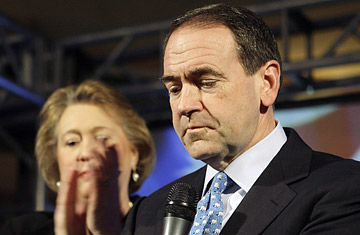
Mike Huckabee drops out of the Republican presidential race on March 4, 2008, in Irving, Texas.
As a kid, Mike Huckabee was no athlete. He didn't have money for nice clothes and felt awkward among his classmates. But ambition fueled him. Though no man in his family had ever finished high school, he aspired to be a leader. So in the seventh grade he ran for student council, against a popular football player.
"He didn't even really care," Huckabee told me about his grade school opponent, as we drove through Des Moines in January of 2007. "He didn't even want to be on the student council. His friends put him up to it at the last minute to be funny. And I was really serious about it. He wasn't. And I thought, golly, what a deal he's got."
People tell themselves stories to survive, and politicians probably more than most. They weave mythologies to keep them going in the face of ridiculous conditions: sleepless weeks of unending town hall meetings, airplane flights, conference calls and attacks on their character, not to mention the microscopic glare of the carnivorous press always predicting their coming demise. For Huckabee, the tale that keeps him going has its roots before puberty, in that student council election. He still sees himself as he was then, the outsider with the skill and determination to out-hustle the world's popular kids.
And, golly, what a job he has done. His concession to John McCain Tuesday night capped off a remarkable year-long odyssey that took the nation and Iowa by storm, defied the expectations of his critics and, ultimately, help set the stage for McCain's nomination. "We started this effort with very little recognition and virtually no resources," Huckabee deadpanned from a hotel ballroom in Irving, Texas, as he took his final bow. "We ended with slightly more recognition and very few resources."
From the beginning of his presidential run, Huckabee was counted out. The list of particulars went on without end: He lacked the money, the connections, the Washington advisors and the endorsements. He was too openly religious. He had a funny last name and crooked teeth, and the fiscal conservatives didn't trust him. His books offered oddly quaint instructions, like "report litter" and "don't swear." He had once supported the release from prison of a rapist, Wayne DuMond, who went on to commit murder. His campaign staff could, for a time, be counted on one hand, then two. He was never expected to be a serious factor.
Yet voters have the final say, so Huckabee persevered, despite single-digit polls and quarterly fund-raising totals well below what other campaigns spent in a week. He flew commercial airlines, carried his own bags, wrote his own talking points, and appeared on cable television every chance he got. By the fall, something was happening in Iowa, largely on the strength on his connection with Evangelical voters. And suddenly all the other candidates had to take notice. In a very literal way, Huckabee had succeeded in selling the merits of his own outsider story.
